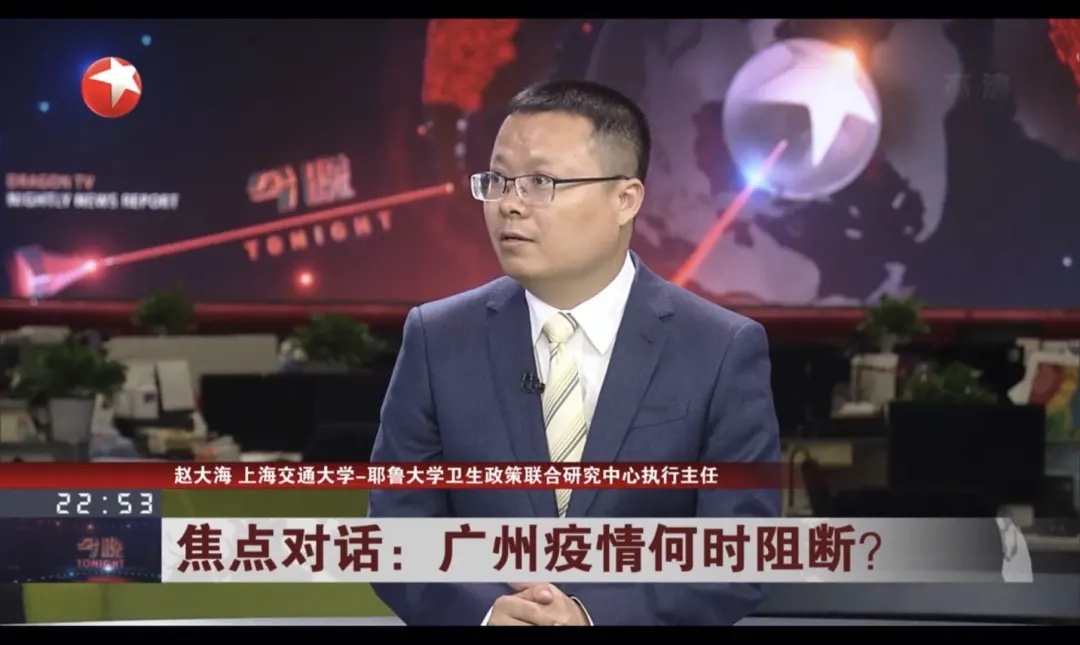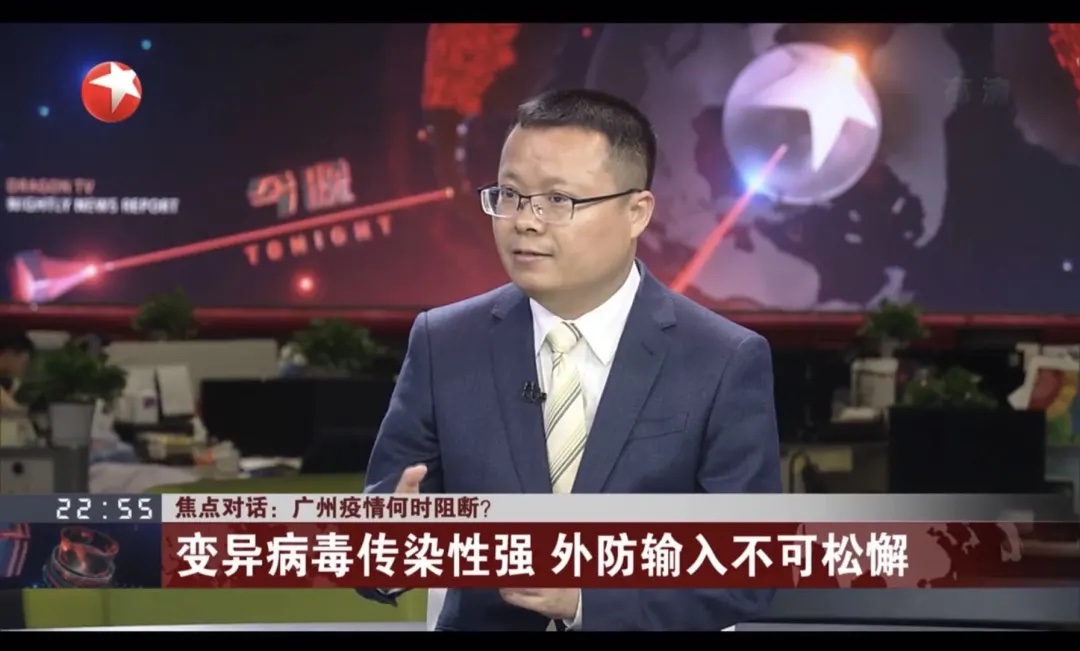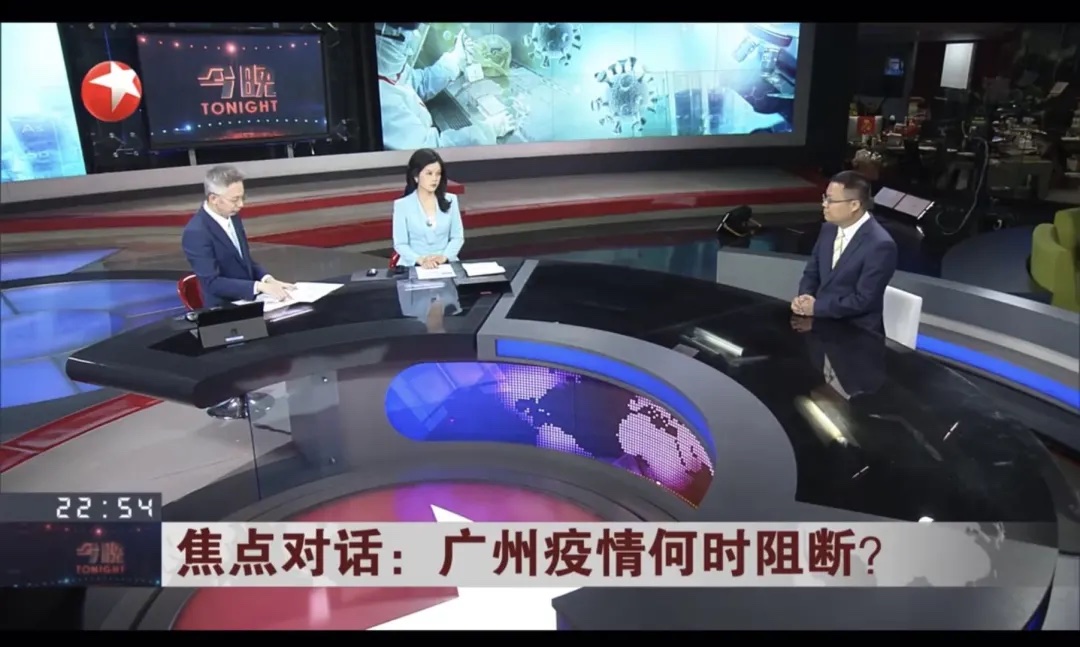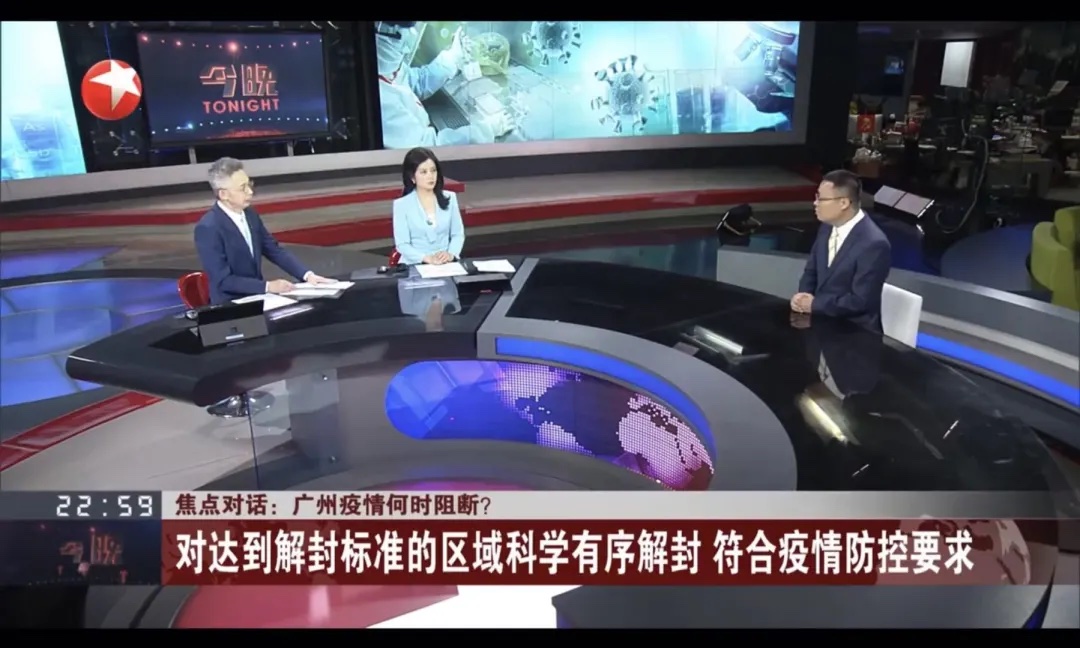上海交大赵大海教授做客东方卫视演播室:广州新冠疫情应很快阻断

上海交通大学国际与公共事务学院教授、博士生导师,上海交通大学-耶鲁大学卫生政策联合研究中心执行主任赵大海,自新冠肺炎疫情暴发以来,对于新冠疫情暴发、防控以及卫生政策第36次接受上海电视台专访,也是第94次接受央视、上视专访。2021年6月14日,赵大海做客东方卫视演播室,在《今晚》节目,就广州散发的新冠疫情进行了解释和评论。现将访谈内容摘录如下。

主持人:有关广州新冠疫情的最新情况,我们在上海的演播室请到了上海交通大学-耶鲁大学卫生政策联合研究中心执行主任赵大海。赵先生您好,我们都知道,在(广州新冠)定点的医院发现医务人员受感染的这样一种情况,实际上给我们敲响了怎样的警钟?
赵大海:新冠定点医院所有医务人员本身所面临的被感染风险就要高于普通医务人员,因此全国各地的相关定点医院要以此为警示,进一步加强新冠疫情的各项程序性的防控工作,以此来保护定点医院的医务人员。与此同时,要进一步加强和落实对于所有定点医院医务人员的定期核酸检测工作。比如说,这次在广州定点医院的这两个院内病例,本身就是通过核酸检测主动发现的,这也可以在一定程度上说明广州定点医院在核酸检测工作的定期检查方面做得还是比较规范的。

主持人:那么就像您刚才讲的,本来定点医院医务人员就在一个高风险的环境当中。那么,当然刚才讲了可能是因为这个暴露在污染的环境下受感染,不过有这样的一个定时检测这样一个手段的话,我们能够控制住这样的一个局面。其实刚才我们看到发言人在谈到了广州的疫情的时候,特别是新确诊的几位,我们发现有几个特点,第一个特点就是传播链其实可以延长相当长的一段这个时间,而且跨越了许多潜伏期,所以从这个角度上来讲,您怎么估计广州目前的疫情?
赵大海:本次广州新冠疫情确实出现了一些相对于全国其他地区之前散在暴发时候的一些新特征,最主要是本次新冠病毒的传播性比较快,变异性也比较强。在这个方面也提示我们全国其他地区,在严防外部输入方面要进一步的加强。
主持人:那这次我们稍微给观众交代一下这次发现的这个病毒的毒株属于哪个?
赵大海:在广州,最开始的毒株是属于在印度的变异毒株。
主持人:目前看有新的毒株被发现吗?
赵大海:目前来看,还基本上是属于这个毒株,但是在一些细微的方面也还是出现了一些变异。其实经过我们过去近一个月在广州的疫情防控,我们基本上已经到了收尾的阶段。应该讲,广州本次的新冠疫情会在一个星期左右的时间内就能够防控住。

主持人:好,谢谢赵先生。很显然赵先生的乐观,我觉得也不无道理。广州市也根据最近的广州的疫情的这样一个形式,采取了一些新的做法。今天有这样一个消息,广州今天宣布了将会对这个封闭封控管理的区域进行有序的解封。所以有可能观众在看到这个消息的时候会有这样的疑问:既然传播链还在延长,为什么又有十一个区域就解封了?相关问题我们来问一下赵先生。刚才我问,它可能跨越了很多的潜伏期,而且出现了多代传播的现象,但是可以看到现在的新闻说,我们可以解封了,在您看来,分类分批解封第一个依据是什么?解封之后我们还要注意哪些措施?
赵大海:这个分类、有序的解封完全是符合我们过去一年多的时间之内对于新冠疫情防控的基本原则,特别是对于在什么样的条件下我们进行封闭,在什么样的条件下进行解封。其实,刚才主持人所提到的广州这几个区,确实已经达到了解封的各项标准和原则,因此我们才会进行相应的解封。与此同时,确实本次广州的散在新冠暴发又有一个多代包括其他方面的特征,但是现在而言,新的病例最主要还是在原先确诊病例的密切接触者这个范围之内,也就是说虽然有新的病例在出现,但基本上还是在所控制的这个群体范围之内。因此,贯彻精准防控原则前提下,一部分继续封闭,但另外一部分已经分类进行解封,同时再进行相应严格的疫情防控工作,应该也是不矛盾的。
主持人:其实广州这次的疫情跟我们在过去有些地方的散发的疫情一样都属于境外输入所导致。但是我们今天也收到消息,温州今天也通报了一例与境外输入确诊病例密切的无症状感染者,东莞也通报了一例境外输入无症状感染者复阳的情况,所以从您的专业的角度来看的话,对境外输入的这样的一种情况,我们还要有哪些更加严格的措施?
赵大海:在过去一年多的时间之内,全国各地都秉持“外防输入、内防反弹”的基本原则。总体而言,包括广州在内,包括刚才您提到的全国其他地区,我们在严防输入方面,其实一直做得相当不错。这次最主要的原因是在于在一些国家,新冠病毒出现了比较大的变异,它的传染性比原先没有变异之前有了比较大的提升。同时,可能在传播的途径等方面,需要进一步来研究,这就要求我们在外防输入的一些细节方面进一步来考究和落实。但总体上,我们现在还不需要对于外防输入进行疫情管控的升级,主要还是在细节方面进一步研究和强化。
供稿:国务学院
日期:2021年6月16日
Dahai ZHAO’s Exclusive Interview with ShanghaiTV: Infections in Guangzhou should be stopped soon
Dahai Zhao, a doctoral supervisor at the School of International and Public Affairs of Shanghai Jiao Tong University and Executive Director of Shanghai Jiao Tong University-Yale University Joint Research Center for Health Policy, has been interviewed by ShanghaiTV for the 36st time (the 94st time by CGTN / ShanghaiTV) since the COVID-19 pandemic. On June 14 2021, Zhao commented on sporadic cases in Guangzhou on “Tonight” of Shanghai TV.
Anchor: What alarm does the fact that medical staffs are found to be infected in the designated hospital in Guangzhou actually sound to us?
ZHAO: All medical staffs in designated hospitals of COVID-19 are at higher risk of infection than ordinary medical staffs. Therefore, relevant designated hospitals across the country should take this as a warning and further strengthen various procedural prevention and control work. At the same time, regular nucleic acid testing for medical staffs in all designated hospitals should be further strengthened and implemented. For example, these two cases in the designated hospital in Guangzhou were found by nucleic acid testing on their own initiative, which can also indicate to a certain extent that the regular examination of nucleic acid testing in the designated hospital in Guangzhou is in compliance with requirements.
Anchor: There are several features of the Guangzhou epidemic. The first feature is that the chain of transmission can actually be extended over a very long period of time, and it spans many incubation periods. From this point of view, how do you estimate the current epidemic in Guangzhou?
ZHAO: Compared with previous outbreaks in other parts of the country, some new features have indeed appeared in this COVID-19 outbreak in Guangzhou. The most important is that this coronavirus has relatively fast transmission and strong variability. In this regard, it also reminds us that the rest of the country should further strengthen the protection against external imports.
Anchor: Which strain of the virus is this time?
ZHAO: In Guangzhou, the original strain was a mutated strain in India.
Anchor: Have any new strains been found?
ZHAO: So far, it's basically the same strain, but there are some subtle variations. After nearly a month of epidemic prevention and control in Guangzhou, we have basically come to the end of the stage. It should be said that the COVID-19 epidemic in Guangzhou will be under control within a week or so.
Anchor: Guangzhou announced today that the lockdown regions will be lifted in an orderly manner. If the chain of transmission is still lengthening, why have 11 regions been lifted? In your opinion, what is the basis? What measures should we pay attention to after the regions is lifted?
ZHAO: Classified and orderly lifting is in line with the basic principles of our prevention and control of COVID-19 over the past year or so, in particular, under what conditions and under what conditions we should lift it. These districts in Guangzhou have indeed met the standards and principles of the lift, and we will lift the lockdown accordingly. In the meantime, new cases have mostly come from close contacts of previously confirmed cases. That means that although there are new cases, they are still largely within the population under control. Therefore, on the premise of implementing the principle of precision prevention and control, some parts have been lifted, while others have been lifted by classification, and corresponding strict epidemic prevention and control work has been carried out.
Anchor: The epidemic in Guangzhou was caused by foreign imports. However, Wenzhou has also reported an asymptomatic infected case who was closely related to a confirmed case imported from abroad, and Dongguan has also reported an asymptomatic infected case who returned to Virginia. What stricter measures should we take against such a case imported from abroad?
ZHAO: Over the past year, the country has upheld the basic principle of "external prevention of input, internal prevention of rebound". In general, in other parts of the country, including Guangzhou, we have actually done a pretty good job of guarding against imports. The main reason this time is that in some countries, coronavirus has a relatively large variation, its infectivity has a relatively large improvement than before the original mutation. At the same time, may be in the way of transmission, such as the need for further research, which requires us to prevent the input of some details to further investigate and implement. However, in general, we do not need to upgrade the control of the epidemic on the import of foreign prevention at present. We mainly need to further research work and strengthen the details.
Contributor: SIPA, SJTU
Date: June 16, 2021

